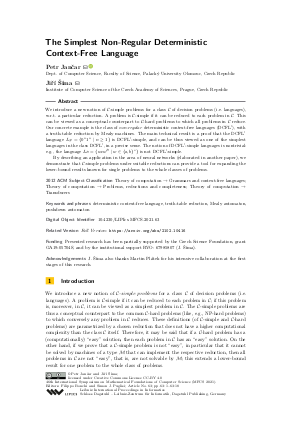The Simplest Non-Regular Deterministic Context-Free Language
Authors
Petr Jančar  ,
Jiří Šíma
,
Jiří Šíma
-
Part of:
Volume:
46th International Symposium on Mathematical Foundations of Computer Science (MFCS 2021)
Part of: Series: Leibniz International Proceedings in Informatics (LIPIcs)
Part of: Conference: Mathematical Foundations of Computer Science (MFCS) - License:
 Creative Commons Attribution 4.0 International license
Creative Commons Attribution 4.0 International license
- Publication Date: 2021-08-18
File

PDF
LIPIcs.MFCS.2021.63.pdf
- Filesize: 0.99 MB
- 18 pages
Document Identifiers
Related Versions
- Full Version https://arxiv.org/abs/2102.10416
Subject Classification
ACM Subject Classification
- Theory of computation → Grammars and context-free languages
- Theory of computation → Problems, reductions and completeness
- Theory of computation → Transducers
Keywords
- deterministic context-free language
- truth-table reduction
- Mealy automaton
- pushdown automaton
Metrics
- Access Statistics
-
Total Accesses (updated on a weekly basis)
0PDF Downloads0Metadata Views
Abstract
We introduce a new notion of 𝒞-simple problems for a class 𝒞 of decision problems (i.e. languages), w.r.t. a particular reduction. A problem is 𝒞-simple if it can be reduced to each problem in 𝒞. This can be viewed as a conceptual counterpart to 𝒞-hard problems to which all problems in 𝒞 reduce. Our concrete example is the class of non-regular deterministic context-free languages (DCFL'), with a truth-table reduction by Mealy machines. The main technical result is a proof that the DCFL' language L_# = {0^n1^n ∣ n ≥ 1} is DCFL'-simple, and can be thus viewed as one of the simplest languages in the class DCFL', in a precise sense. The notion of DCFL'-simple languages is nontrivial: e.g., the language L_R = {wcw^R∣ w ∈ {a,b}^*} is not DCFL'-simple.
By describing an application in the area of neural networks (elaborated in another paper), we demonstrate that 𝒞-simple problems under suitable reductions can provide a tool for expanding the lower-bound results known for single problems to the whole classes of problems.
Cite As Get BibTex
Petr Jančar and Jiří Šíma. The Simplest Non-Regular Deterministic Context-Free Language. In 46th International Symposium on Mathematical Foundations of Computer Science (MFCS 2021). Leibniz International Proceedings in Informatics (LIPIcs), Volume 202, pp. 63:1-63:18, Schloss Dagstuhl – Leibniz-Zentrum für Informatik (2021)
https://doi.org/10.4230/LIPIcs.MFCS.2021.63
BibTex
@InProceedings{jancar_et_al:LIPIcs.MFCS.2021.63,
author = {Jan\v{c}ar, Petr and \v{S}{\'\i}ma, Ji\v{r}{\'\i}},
title = {{The Simplest Non-Regular Deterministic Context-Free Language}},
booktitle = {46th International Symposium on Mathematical Foundations of Computer Science (MFCS 2021)},
pages = {63:1--63:18},
series = {Leibniz International Proceedings in Informatics (LIPIcs)},
ISBN = {978-3-95977-201-3},
ISSN = {1868-8969},
year = {2021},
volume = {202},
editor = {Bonchi, Filippo and Puglisi, Simon J.},
publisher = {Schloss Dagstuhl -- Leibniz-Zentrum f{\"u}r Informatik},
address = {Dagstuhl, Germany},
URL = {https://drops.dagstuhl.de/entities/document/10.4230/LIPIcs.MFCS.2021.63},
URN = {urn:nbn:de:0030-drops-145037},
doi = {10.4230/LIPIcs.MFCS.2021.63},
annote = {Keywords: deterministic context-free language, truth-table reduction, Mealy automaton, pushdown automaton}
}
Author Details
- Dept. of Computer Science, Faculty of Science, Palacký University Olomouc, Czech Republic
Funding
Presented research has been partially supported by the Czech Science Foundation, grant GA19-05704S, and by the institutional support RVO: 67985807 (J. Šíma).
Acknowledgements
J. Šíma also thanks Martin Plátek for his intensive collaboration at the first stages of this research.
References
- M. Anabtawi, S. Hassan, Christos A. Kapoutsis, and M. Zakzok. An oracle hierarchy for small one-way finite automata. In Proceedings of LATA 2019, LNCS 11417, pages 57-69. Springer, 2019. URL: https://doi.org/10.1007/978-3-030-13435-8_4.
- Jean Berstel and Luc Boasson. Context-free languages. In Jan van Leeuwen, editor, Handbook of Theoretical Computer Science, Volume B: Formal Models and Semantics, pages 59-102. Elsevier and MIT Press, 1990. URL: https://doi.org/10.1016/b978-0-444-88074-1.50007-x.
- Sheila A. Greibach. The hardest context-free language. SIAM J. Comput., 2(4):304-310, 1973. URL: https://doi.org/10.1137/0202025.
- John E. Hopcroft and Jeffrey D. Ullman. Formal languages and their relation to automata. Addison-Wesley, 1969. URL: https://www.worldcat.org/oclc/00005012.
- Petr Jančar. Deciding semantic finiteness of pushdown processes and first-order grammars w.r.t. bisimulation equivalence. J. Comput. Syst. Sci., 109:22-44, 2020. URL: https://doi.org/10.1016/j.jcss.2019.10.002.
- Petr Jančar, František Mráz, Martin Plátek, and Jörg Vogel. On monotonic automata with a restart operation. J. Autom. Lang. Comb., 4(4):287-311, 1999. URL: https://doi.org/10.25596/jalc-1999-287.
- František Mráz, Dana Pardubská, Martin Plátek, and Jiří Šíma. Pumping deterministic monotone restarting automata and DCFL. In Proceedings of ITAT 2020, CEUR Workshop Proceedings 2718, pages 51-58, 2020. URL: http://ceur-ws.org/Vol-2718/paper13.pdf.
- Klaus Reinhardt. Hierarchies over the context-free languages. In Proceedings of IMYCS 1990, LNCS 464, pages 214-224. Springer, 1990. URL: https://doi.org/10.1007/3-540-53414-8_44.
-
Hava T. Siegelmann. Neural networks and analog computation - Beyond the Turing limit. Birkhäuser, 1999.

- Jiří Šíma. Analog neuron hierarchy. Neural Netw., 128:199-215, 2020. URL: https://doi.org/10.1016/j.neunet.2020.05.006.
- Jiří Šíma. Stronger separation of analog neuron hierarchy by deterministic context-free languages, 2021. (submitted to a journal). URL: http://arxiv.org/abs/2102.01633.
- Jiří Šíma and Pekka Orponen. General-purpose computation with neural networks: A survey of complexity theoretic results. Neural Comput., 15(12):2727-2778, 2003. URL: https://doi.org/10.1162/089976603322518731.
- Jiří Šíma and Martin Plátek. One analog neuron cannot recognize deterministic context-free languages. In Proceedings of ICONIP 2019, Part III, LNCS 11955, pages 77-89. Springer, 2019. URL: https://doi.org/10.1007/978-3-030-36718-3_7.
- Tomoyuki Yamakami. Oracle pushdown automata, nondeterministic reducibilities, and the hierarchy over the family of context-free languages. In Proceedings of SOFSEM 2014, LNCS 8327, pages 514-525. Springer, 2014. (full version https://arxiv.org/abs/1303.1717). URL: https://doi.org/10.1007/978-3-319-04298-5_45.
